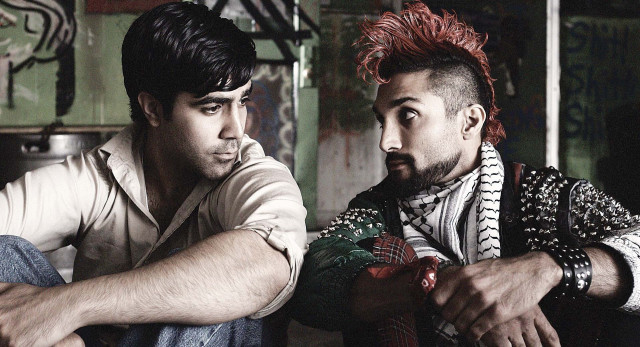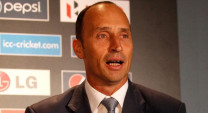Taqwacore: Burqas and Mohawks
The Taqwacores bursts with riotous energy as its characters try to find their own voice.

Taqwacore: Burqas and Mohawks
Based on Michael Muhammed Knight’s punk fiction classic book The Taqwacores, American-Syrian director Eyad Zahra’s film of the same name is left of the Islamic middle. Very left. And if you aren’t busy getting offended by its more anarchic pronunciations you will probably find that it has a great sense of humour.
Knight apparently wrote the book as a way of working through his own identity struggles as a Muslim convert but has had to adjust to the predictive reality of his work. Initially given away for free in the parking lots of mosques, The Taqwacores became a manifesto of sorts for the Muslim punk movement in the USA. Bands like The Kominas, Al-Thawra, Vote Hezbollah and The Dead Bhuttos (apparently a salute to the punk band The Dead Kennedys) burgeoned in the greenhouse of Knight’s punk fantasy, singing noisily and sarcastically about imposing “Sharia Law in the USA”.
The novel/film is narrated from the perspective of American-Pakistani Yusef (Bobby Naderi), a mother’s boy who moves into a Muslim hostel in Buffalo only to find his housemates are radically different to anything he may have experienced in his sheltered suburban life. His new home is like a Muslim punk reworking of The Breakfast Club — there is a skater with an attitude, a heavy-handed fundamentalist keeping the faith, a leather-clad Jim Morrison type with a Mohawk, a gay drag queen from “Khalifornia” and a ‘riot grrrl’ who wears a burqa almost out of spite.
This is not a film, however, about rejecting religion; rather more about owning it and personalising it. As the story (what little there is of it) progresses, Yusef’s wide eyed-innocence is severely tested. His telephone conversations with his parents dwindle as he is taken on an exploratory ride through his new friends’ anarchic lifestyle. There is sex, booze and punk music. There are also mosque excursions, theology debates and prayers five times a day. And then there is raucous music from The Kominas; which blares uncompromisingly throughout, adding to the riotous energy of the film.
Eyad Zahra chooses to shoot The Taqwacores guerrilla-style in an actual punk house. The camera moves jaggedly without apology. The palette is gritty, gray and thin; what one critic rightly likens to “a Xerox from a crumpled music ‘zine.” All this works splendidly. It may be a little rough around the edges, but the edginess acclimatises well to its subject.
This is fairly confident filmmaking from a first-time director who acknowledges that Knight’s imaginary punk had a huge impact on his own reality. “Being a Muslim in America just never felt right. But that all changed after The Taqwacores ... Gender equality, homosexuality, and freedom of expression were just a few of the many topics explored in the novel; to hear these points debated in an Islamic setting was downright groundbreaking.”
For those who may think casting a film consisting primarily of non-white characters could be a challenge, The Taqwacores is a revelation. The virtually unknown ensemble cast is uniformly effective: Bobby Naderi’s hesitant, shy Yusef grounds the film and Dominic Rains’ flamboyant, soulful Jehangir is the stuff punk legends are made of.
Unexpectedly, the most in-your-face performance comes from an actor you (almost) never see. In a radical departure from her last film The Back-up Plan (co-starring Jennifer Lopez) Noureen Dewulf impresses from beyond the burqa as the swaggering, strident Rabeya. Hers is also probably the most controversial, complex role in a film where the other primary characters are all male.
‘The Taqwacores is for the next generation’ - Eyad Zahra
I spent an hour talking to Eyad Zahra and Bobby Naderi while their film was being screened at the London Film Festival. It was supposed to be 10 minutes but how do you discuss the rise of Muslim punk, the headache of being American and Muslim, generational issues with orthodoxy and the making of The Taqwacores in 10 minutes?
Thankfully the director and his lead actor were young, willing, able and seemingly untouched by the critical praise heaped on them at Sundance earlier this year. Plus they had a wonderfully subversive plan to get The Taqwacores across to Pakistan.
What more could my inner punk ask for?
The Taqwacores is a ‘shock and awe’ kind of film that is bound to divide people, especially along religious lines. Do you think you could ever realistically hope to show this film in the Muslim world?
Eyad Zahra: Listen, we know it’s not really going to play in Syria, Pakistan or Iran. But luckily these countries have a huge bootleg market so the film will eventually make it through. Actually, we were thinking of releasing a bootleg copy of the film ourselves in these places! For now we have managed to strike a deal for a limited release in some Asian territories. It’s nothing big but it’s a way into that market. The way I see it, you don’t make this kind of film for just one year — you make it for a long time ahead. It’s not going to age; actually it will become even more relevant. And it will invariably divide opinions. My elder brother, who is five years older than me, is very offended by the film. But my sister who is 10 years younger loves it. Actually, I happen to believe that The Taqwacores is for the next generation.
Bobby Naderi: We never did it just to shock and awe. Sure, it might shock and awe some people but that’s not why we made the film. A lot of talking was done before we started filming; we didn’t rush into it. If you are ready to give the film a real chance, you will see it from a different place.
Despite the obviously controversial tone of the film you seem to have managed to escape the usual death threats and fatwas. Do you think this is because the film has played to limited audiences on the festival circuit?
EZ: Michael Muhammed Knight’s book has been around for a while. Even people in Saudi Arabia can order it on Amazon. So The Taqwacoreshasn’t sprung out of nowhere. I think a lot of Muslims come to see the film wanting to condemn it but they can’t because it comes from such a sincere place. There is a scene in the film where Jehangir questions the making of it in a way. Was it the right thing to do? I think we were always very aware of what we were doing but it was a film that had to be made. And it had to go to the extremes it goes to be relevant.
What is it like growing up Muslim in American suburbia? Did your own experience show up in the film?
EZ: Muslims in the West are obsessed with a sugar-coated version of home. I struggled to deal with where I was living, and how I was being conditioned to think and act. My surroundings never felt like home. My home never felt like home. Growing up, I was a bit like Yusef because that’s all I knew about being a Muslim. After high school I visited Syria and my cousin showed me a different side of the country which was so much more liberal. Clearly they had moved on, but my family in America hadn’t.
What was it like working with author Michael Muhammed Knight to adapt the novel to film? Was it difficult for him to relinquish control over what has essentially become a cult classic?
EZ: The novel jumps constantly. It’s unstructured and we had to tone that down for the film. Michael and I had to learn to trust each other. It was difficult at first because those characters have lived inside him for so long. At one point he wanted to make Jehangir less heroic, less of a punk superstar, but the reality is that’s what makes the story. You need that guy to be larger than life.
I also chose to play up the homo-eroticism of the film: Jahangir for instance is very affectionate with the men around him. I created a larger role for Muzammil, the only gay character. He wasn’t that prominent in the novel but I thought it was important to address the issue of homosexuality within religion because it’s usually brushed aside in cinema. It’s a defining moment for the film when Yusef stands up to Umar, the fundamental Muslim, and says this person will be accepted regardless of his sexual orientation.
Maybe even more controversial in what is a male coming-of-age film is Rabeya, who stays mysteriously veiled throughout the film yet ends up causing the greatest fallout of the story with a defiant and very public sexual act
EZ: Rabeya is the unseen woman in many of our lives. As a Muslim man you tend to grow up not seeing women and she throws that invisibility back in your face. Even though you can’t see her you can’t ignore her. That final scene is chaos. It’s one thing leading to another, but it’s not ultimately sexual. The thing with Rabeya is that she takes the power back for herself. She takes a pornographic moment that traditionally subjugates women and uses it as a powerful act of defiance.
BN: Actually, my mother felt that was the most powerful scene in the film. As a woman who grew up in Iran where women are constantly being told what to do, she understood why Rabeya would react so strongly when pushed to an extreme.
How do you think Yusef comes of age in the film? Do you think it is a progressive loss of innocence?
BN: I don’t think he loses anything, he simply grows up. When you’re young you’re full of fire and I think some people do lose their innocence when they are exploring life. But I think Yusef finds something bigger — he finds his own voice.
EZ: I see it differently. I think he does lose his innocence. By the end of the film he is changed. No one keeps their innocence in life as they grow. People ask, is Yusef a punk? He doesn’t show it but yes he is. Being a punk is not just wearing a Mohawk or an earring, it’s how you look at the world. Real punk is about sitting down and sharing incredibly philosophical conversations about life; it’s about debating and challenging norms. By the end Yusef is less afraid to flout rules; like it’s a big thing for him to pray without washing. But these are private rather than public statements. His loss of innocence is internal. He might still end up marrying that Muslim girl his parents would want him to, but he may be more open to his kids being rebellious. To his family Yusef will still seem like the same guy that went to live in a Muslim house in Buffalo but when he looks at himself in the mirror, he knows he’s changed.
BN: But he’s still his own person, he still retains some of that innocence inside him. He doesn’t agree with everything people in the house do. It was tough getting into the skin of the character. I don’t physically look like a shy kid. He’s very much a male Alice in Wonderland. As an actor I had to strip everything away to find Yusef.
How has making The Taqwacores helped you grapple with your own ‘Muslim-ness’ in a post-9/11 America? Did you end up losing your religion or did you find it?
EZ: Before 9/11 I was never homogenously Muslim. 9/11 put a spotlight on everything I was having an identity crisis with. The novel, of course, was also written after 9/11 and Michael was exploring his own ideas of Muslim identity. My relationship with Islam was waning. All my friends were either totally devout or had rejected religion altogether. Personally, I had put religion on the shelf and didn’t want to deal with it. The Taqwacores allowed me to put religion back on the table — to talk and think about it again. It helped me realise that it isn’t all about acceptance; it’s about questioning oneself.
Published in The Express Tribune, October 31st, 2010.



















COMMENTS
Comments are moderated and generally will be posted if they are on-topic and not abusive.
For more information, please see our Comments FAQ